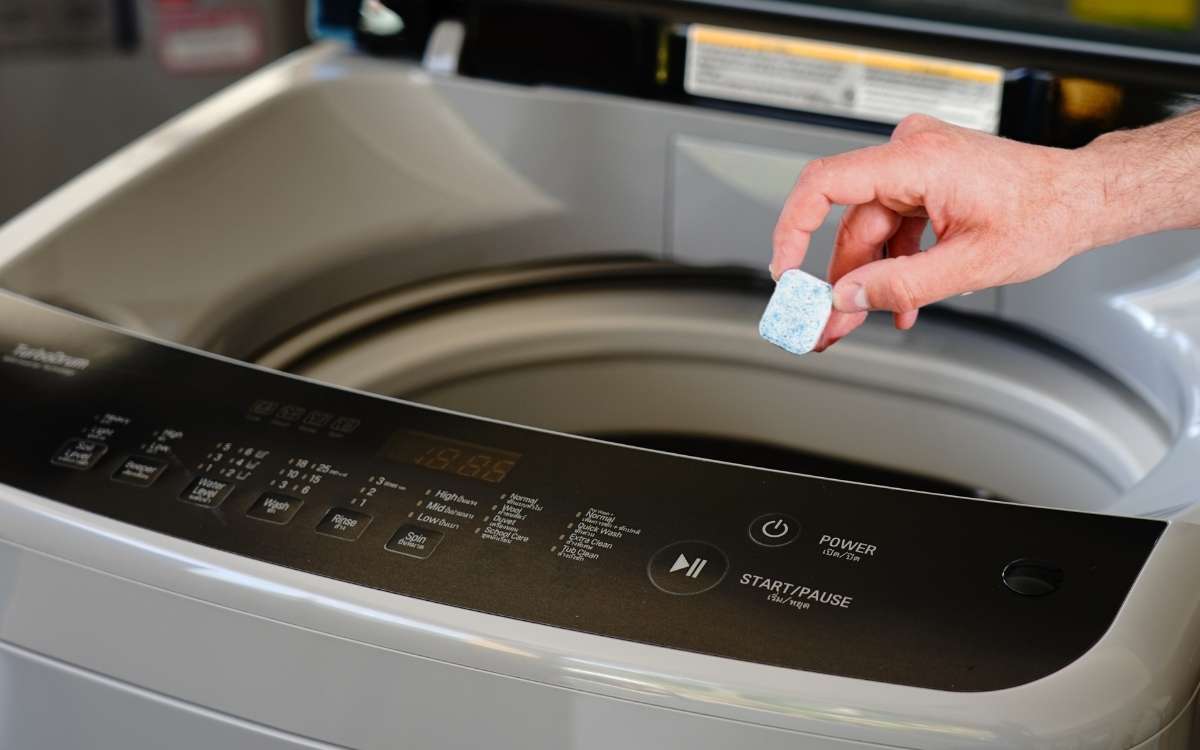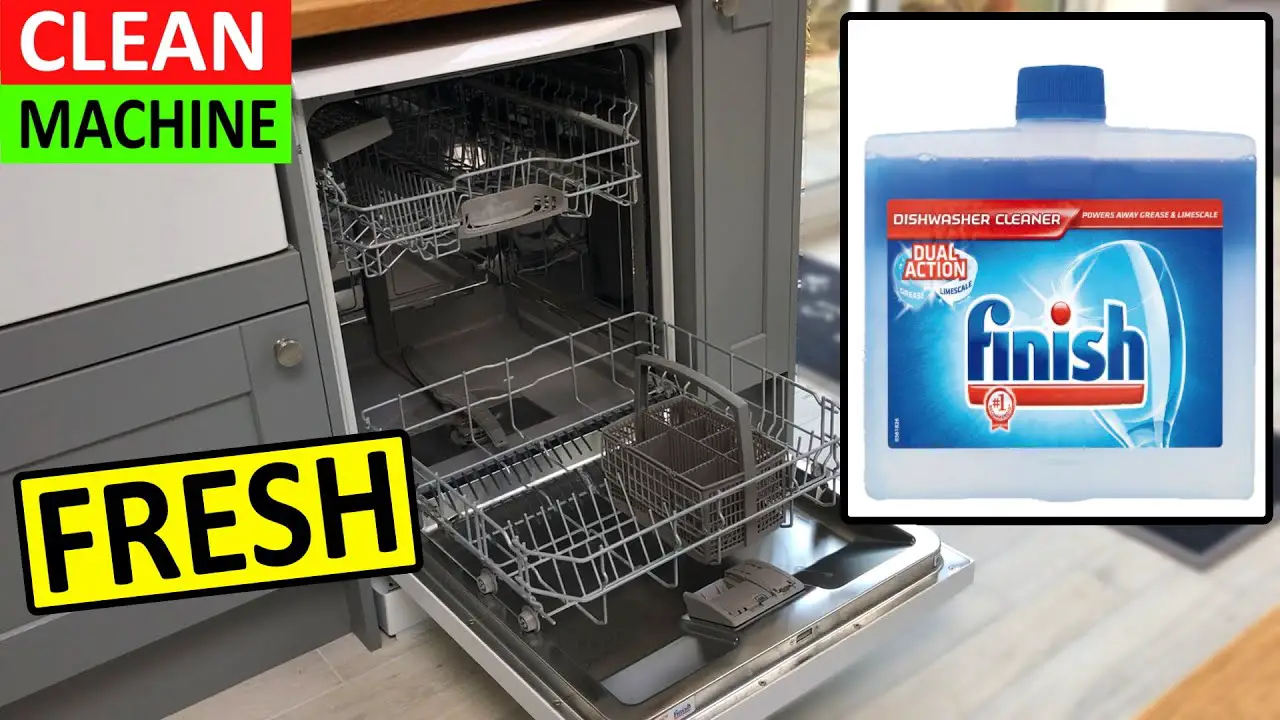Yes, washing machine cleaner should not be used in a dishwasher. Using washing machine cleaner in a dishwasher can damage the appliance and potentially leave harmful residue on your dishes.
It is important to use the correct cleaner specifically designed for dishwashers to ensure optimal cleaning performance and prevent any potential harm. By following the manufacturer’s instructions and using dishwasher cleaners, you can effectively maintain the cleanliness and functionality of your dishwasher, resulting in sparkling dishes and a longer lifespan for your appliance.
Understanding The Differences Between Washing Machines And Dishwashers
Washing machines and dishwashers have different cleaning agents, so you should not use washing machine cleaner in a dishwasher. It’s important to understand the differences between the two appliances to keep them working efficiently.
Washing machines and dishwashers are household appliances that are designed for distinct purposes. While both serve the purpose of cleaning, they operate on different cleaning mechanisms and have unique requirements. Understanding the differences between washing machines and dishwashers can help you determine whether using washing machine cleaner in a dishwasher is a viable option.
Below, we explore the key factors that differentiate these appliances.
Different Cleaning Mechanisms:
- Washing machines rely on a rotating drum to wash clothes, agitating them to remove dirt and stains. They use detergent and water to facilitate the cleaning process.
- Dishwashers, on the other hand, use spraying arms that release water and detergent under high pressure to clean dishes. The spraying action ensures thorough coverage and effectively removes food particles.
Varied Detergent Requirements:
- Washing machines generally require powdered or liquid detergents specifically formulated for laundry use. These detergents contain ingredients tailored to remove stains, odors, and maintain fabric quality.
- Dishwashers, however, require specialized dishwasher detergents that are designed to dissolve food residues, prevent water spots, and protect delicate glassware.
Temperature And Water Pressure Variations:
- Washing machines typically operate at higher temperatures between 30 to 60 degrees Celsius (86 to 140 degrees Fahrenheit). The higher temperature aids in the removal of stains and kills bacteria.
- Dishwashers, on the other hand, use lower temperatures between 45 to 65 degrees Celsius (113 to 149 degrees Fahrenheit) to effectively clean dishes. High temperatures can damage delicate items or cause them to crack.
Unique Components And Materials:
- Washing machines have components like an agitator or an impeller, which are designed to move clothes around and ensure effective cleaning. The drum is typically made of stainless steel or a durable plastic material.
- Dishwashers, however, have different components such as spraying arms, racks, and filters. The interior of a dishwasher is usually made of stainless steel or a combination of plastic and stainless steel.
Washing machines and dishwashers operate on different cleaning mechanisms, require specific detergent types, have variations in temperature and water pressure, and possess unique components and materials. Understanding these differences is crucial in determining whether you can use washing machine cleaner in a dishwasher.
Risks And Potential Damage From Using Washing Machine Cleaner In A Dishwasher
Using washing machine cleaner in a dishwasher can pose risks and potential damage. It is important to avoid this as the cleaner is formulated differently for the specific appliances.
Using the wrong cleaning product in your dishwasher can have unintended consequences, and washing machine cleaner is definitely not suitable for use in this appliance. Here are the risks and potential damages that can occur:
Chemical Reactions And Residues
- The chemicals in washing machine cleaner are formulated specifically for the different materials and components of a washing machine. When used in a dishwasher, these chemicals can interact with the different materials and designs of the dishwasher, leading to unpredictable chemical reactions.
- Residues from washing machine cleaner may be left behind in the dishwasher, which could contaminate your dishes and utensils during future wash cycles. These residues may also impact the performance of the dishwasher, leading to issues like poor cleaning results or unpleasant odors.
Corrosion Of Dishwasher Parts
- Washing machine cleaner contains powerful cleaning agents that may be too abrasive for the delicate components of a dishwasher. If used in a dishwasher, these cleaners can potentially corrode the internal parts over time. This can result in leaks, reduced functionality, and costly repairs or replacements.
Damaged Seals And Gaskets
- Dishwashers rely on seals and gaskets to prevent water leakage. The harsh chemicals in washing machine cleaner can deteriorate these vital components, causing leaks and compromising the effectiveness of the dishwasher’s water containment system.
Effects On Dishware And Utensils
- The chemicals from washing machine cleaner can leave residues on dishware and utensils that come into contact with them during a wash cycle. This can lead to an unpleasant taste or odor on your dishes, rendering them unappetizing or even unsafe to use.
- In some cases, the chemicals can cause discoloration or damage to certain types of dishware, such as delicate glassware or items with sensitive finishes or coatings. This can result in an unsightly appearance or the need to replace damaged items.
It’s important to always use cleaning products specifically designed for the dishwasher to avoid these risks and potential damages. Proper maintenance and regular cleaning using appropriate dishwasher cleaner will help keep your dishwasher in optimal condition and ensure sparkling clean dishes every time.
Safe And Effective Alternatives To Washing Machine Cleaner For Dishwashers
Discover safe and effective alternatives to washing machine cleaner for dishwashers. Find out if it’s possible to use washing machine cleaner in a dishwasher and explore other options for keeping your dishwasher clean and fresh.
Dishwashers, like washing machines, require regular cleaning to maintain their performance and prolong their lifespan. While washing machine cleaners are specifically designed for washing machines, it’s important to note that they should not be used in dishwashers. Fortunately, there are safe and effective alternatives to washing machine cleaner that you can use to keep your dishwasher clean and running smoothly.
In this section, we will explore natural cleaning agents, vinegar and baking soda solutions, commercial dishwasher cleaners, and dishwasher maintenance and cleaning tips.
Natural Cleaning Agents:
Natural cleaning agents are a popular choice when it comes to cleaning dishwashers. They are safe, environmentally friendly, and often readily available in your kitchen pantry. Here are some natural cleaning agents you can use:
- Lemon juice: The acidity of lemon juice helps dissolve grease and mineral deposits in your dishwasher.
- Citric acid: This natural acid can effectively remove limescale and buildup from the interior of your dishwasher.
- White vinegar: Vinegar is a powerful natural cleaner that can help remove odors, stains, and mineral buildup in your dishwasher.
Using these natural cleaning agents is an easy and affordable way to keep your dishwasher clean without resorting to harmful chemicals.
Vinegar And Baking Soda Solutions:
Vinegar and baking soda are two common household ingredients that can be used together to clean your dishwasher. Here’s how you can create a vinegar and baking soda solution:
- Empty the dishwasher: Ensure that your dishwasher is empty before starting the cleaning process.
- Vinegar rinse: Pour a cup of white vinegar into a dishwasher-safe cup or bowl and place it on the top rack of your dishwasher.
- Baking soda scrub: Sprinkle one cup of baking soda along the bottom of your dishwasher.
- Run a wash cycle: Run a hot water cycle without any dishes to allow the vinegar and baking soda to work their magic.
The combination of vinegar and baking soda helps remove grease, grime, and residue, leaving your dishwasher clean and fresh.
Commercial Dishwasher Cleaners:
If you prefer a ready-made solution specifically designed for dishwashers, there are various commercial dishwasher cleaners available in the market. These cleaners are formulated to tackle tough stains, eliminate odors, and remove limescale buildup. When choosing a commercial dishwasher cleaner, look for one that is recommended for your dishwasher brand and model.
Follow the instructions on the packaging for best results.
Dishwasher Maintenance And Cleaning Tips:
In addition to using natural cleaning agents, vinegar and baking soda solutions, or commercial dishwasher cleaners, regular maintenance and cleaning can prevent the need for deep cleaning. Here are some tips to keep your dishwasher in great shape:
- Scrape off food debris: Before loading your dishes, scrape off any large food particles to prevent clogging the dishwasher’s drainage system.
- Rinse dishes: Rinse off dishes that have excess food residue to avoid buildup in the dishwasher.
- Clean the filter: Regularly remove and clean the dishwasher filter to prevent blockages and optimize cleaning performance.
- Wipe down the door seal: Use a damp cloth to clean the door seal and remove any trapped food particles or residue.
- Run a monthly cleaning cycle: Once a month, run an empty dishwasher with a cup of vinegar to keep it fresh and clean.
By following these maintenance and cleaning tips, you can keep your dishwasher performing at its best and avoid the need for heavy-duty cleaning.
While washing machine cleaner should not be used in dishwashers, there are many safe and effective alternatives available. Natural cleaning agents like lemon juice, citric acid, and vinegar, along with baking soda solutions, can effectively clean your dishwasher. If you prefer a ready-made solution, commercial dishwasher cleaners are also an option.
Remember to regularly clean and maintain your dishwasher to prevent the need for deep cleaning. Keep your dishwasher running smoothly and enjoy sparkling clean dishes every time!
How To Properly Clean And Maintain A Dishwasher
Maintaining a dishwasher involves proper cleaning techniques, but using washing machine cleaner is not recommended. Stick to dishwasher-specific cleaning products to ensure the best results and avoid any potential damage.
Cleaning and maintaining your dishwasher is essential to ensure that it functions effectively and lasts longer. Neglecting this routine may result in poor performance and the need for costly repairs. By following a few simple steps, you can keep your dishwasher clean and optimized for efficient use.
Regular Cleaning Routine:
- Clean the exterior surfaces of the dishwasher regularly using a soft cloth and mild detergent. Wiping away any dirt or stains will keep it looking new and prevent grime buildup.
- Start a cleaning routine by inspecting the interior. Look for any stuck food debris or mineral deposits that may hinder performance.
- Run an empty dishwasher cycle at least once a month with a dishwasher cleaner to eliminate any accumulated grime and odors. This helps maintain the hygiene of your dishwasher.
Removing Food Debris:
- Prior to loading any dishes, scrape off excess food particles. This helps prevent clogging of the drain and spray arms.
- For hard-to-remove debris, use a toothbrush or a dishwasher-safe brush to scrub away residue from the filter and other areas where food particles tend to accumulate.
- Ensuring that the dishwasher is free of food debris reduces the risk of blockages and prolongs its life.
Cleaning Filters And Spray Arms:
- Regularly clean the dishwasher’s filters. Detach them according to the manufacturer’s instructions and rinse away any trapped food particles. A clogged filter can impair the dishwasher’s performance.
- Inspect the spray arms for blockages. If necessary, remove them and rinse away any debris using warm water. This ensures that the water jets are unobstructed and can clean dishes effectively.
Descaling The Dishwasher:
- Over time, mineral deposits and limescale can build up inside the dishwasher, affecting its efficiency. Descaling the dishwasher helps remove these deposits.
- Place a dishwasher-safe container filled with white vinegar on the bottom rack of the empty dishwasher. Run a complete cycle on a hot water setting.
- After the cycle finishes, wipe the interior and exterior of the dishwasher with a cloth soaked in vinegar to remove any remaining mineral deposits.
- Repeat this process every few months to keep your dishwasher functioning optimally.
By incorporating these simple cleaning and maintenance steps into your routine, you can extend the life of your dishwasher and ensure it continues to provide sparkling clean dishes. Remember, a clean dishwasher means clean dishes!
Tips To Prevent Dishwasher Odors And Residue Build-Up
Prevent dishwasher odors and residue build-up by utilizing specific tips. However, using washing machine cleaner in a dishwasher is not recommended. Follow our expert advice to keep your machine clean and fresh.
Dishwashers make our lives so much easier by providing a convenient way to clean our dishes, but over time, they can develop unpleasant odors and residue build-up. To keep your dishwasher smelling fresh and running efficiently, here are some tips you can follow:
Proper Loading And Spacing:
- Ensure that dishes are not overcrowded in the dishwasher. Leave enough space between each item to allow water and detergent to circulate freely.
- Place larger items such as pots and pans on the bottom rack, and more delicate items like glasses and cups on the top rack.
- Avoid blocking the spray arm and the detergent dispenser with bulky items.
- Pre-rinse or scrape off excess food particles before loading the dishes to prevent clogs and residue build-up.
Use Of Rinse Aids:
- Consider using rinse aids in your dishwasher cycle. Rinse aids help to minimize water spots, enhance drying, and prevent residue from sticking to your dishes.
- Fill the rinse aid dispenser according to the manufacturer’s instructions.
- Regularly check the rinse aid level and refill as needed to ensure optimal performance.
Frequent Cleaning And Maintenance:
- Clean the dishwasher filter regularly to prevent particles and debris from clogging the drain and spraying onto your dishes.
- Remove and clean the spray arm periodically to ensure proper water circulation and prevent residue build-up.
- Wipe down the interior of the dishwasher, including the door gasket, with a damp cloth to remove any food particles or grease.
- Consider running an empty dishwasher cycle with a dishwasher cleaner once a month to remove odors, stains, and mineral deposits.
Avoiding Certain Food Residues:
- Rinse off or scrape food residues from dishes before loading them into the dishwasher. Some items like egg yolks, cheese, and starchy foods can leave behind stubborn residues.
- Avoid placing items with excessive grease or oil in the dishwasher, as they can cause clogs and leave a greasy film on your dishes.
- Citrus-based dishwashing detergents can help cut through grease and remove odors, so consider using them if you frequently deal with greasy dishes.
By following these tips, you can prevent dishwasher odors and residue build-up, ensuring that your dishes come out sparkling clean and your dishwasher stays in good working condition. Remember to regularly clean and maintain your dishwasher to keep it running efficiently and prolong its lifespan.
So go ahead, load those dirty dishes with confidence and let your dishwasher do the dirty work for you!

Credit: houselovelyhome.com
Frequently Asked Questions About Using Washing Machine Cleaner In A Dishwasher
Using washing machine cleaner in a dishwasher is not recommended as they are formulated differently for their respective purposes. It’s best to use a dishwasher cleaner specifically designed for dishwashers to ensure optimal performance and cleanliness.
Can Dishwasher Detergent Be Used In A Washing Machine?
If you’ve ever wondered about using dishwasher detergent in your washing machine, the answer is no. Dishwasher detergent and laundry detergent are formulated differently to cater to their respective cleaning needs. Here are some reasons why you should never use dishwasher detergent in a washing machine:
- Dishwasher detergents are designed to remove food residues and grease, while laundry detergents are specifically made to tackle stains and dirt found on clothes.
- Dishwasher detergents contain high levels of alkaline and bleach, which can damage the delicate fabrics of clothes and cause colors to fade.
- The high foaming agents present in dishwasher detergents can cause excessive sudsing in a washing machine, leading to overflow and potentially damaging the appliance.
It’s best to stick to using laundry detergent designed for washing machines to ensure proper cleaning and maintenance.
Frequently Asked Questions Of Can You Use Washing Machine Cleaner In A Dishwasher
Is There A Difference Between Dishwasher Cleaner And Washing Machine Cleaner?
Yes, there is a difference between dishwasher cleaner and washing machine cleaner.
Can You Use An Affresh Washing Machine Cleaner To Clean A Dishwasher?
No, you cannot use Affresh washing machine cleaner to clean a dishwasher.
What Cleaner Can You Use In A Dishwasher?
You can use a dishwasher cleaner specifically designed for dishwashers.
What Is The Best Cleaner For A Dishwasher?
The best cleaner for a dishwasher is a vinegar solution or dishwasher cleaner specifically designed for the task.
Conclusion
It’s important to note that while washing machine cleaner and dishwasher cleaner may seem similar, they are not interchangeable. Using washing machine cleaner in a dishwasher can lead to unwanted residue, clogs, and even damage to the appliance. Dishwasher cleaners are specifically formulated to tackle grease, food particles, and hard water deposits that can build up in the dishwasher’s interior.
These cleaners also help to eliminate odors and improve overall performance. To keep your dishwasher running smoothly and effectively, it is recommended to stick to using dishwasher cleaner that is designed for this specific appliance. By following this guideline, you can ensure that your dishwasher stays clean, odor-free, and in top-notch condition for years to come.





